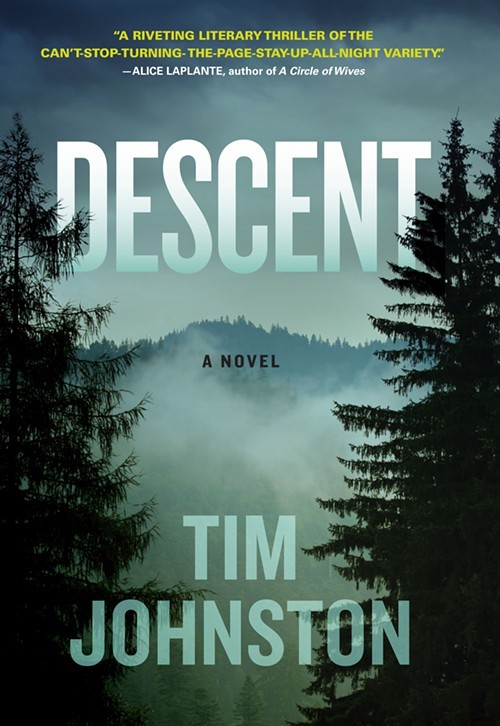In an interview with his publisher and included in the publicity materials to his debut novel, author Tim Johnston talked about literary fiction (the kind he was schooled in at the University of Iowa and the University of Massachusetts-Amherst) and the other kind, the fiction he’d grown up on and always been excited by: plot-driven page-turners — in Johnston’s own words, “the kind of story I loved to read before I knew the world made a distinction between a great story and great writing.”
[jump]

Descent (Algonquin Books), Johnston’s debut novel, is both — a story that, in broad outline, reads as if borrowed from today’s sensationalized headlines, but it’s a story with more to it than any one headline could convey.
“Gone Girl”? Yes, Descent is an abduction/suspense story, and the girl at the center of it is a high school track star named Caitlin Courtland. When the book opens, she’s 18 and headed for college in the fall, until, on a family vacation and while jogging in the Rockies near the Great Divide, she goes missing, with only her brother, age 15, as semiconscious witness to what happened.
Months then years later, Caitlin is still missing, and her parents and brother are as separated from one another as Caitlin is from them. Her father, Grant, has stayed in Colorado on the off-chance that a clue to his daughter’s whereabouts (or remains) might materialize. Caitlin’s mother, Angela, has returned to Wisconsin, where the family lived and where she descends deeper into her own past and present griefs. And Caitlin’s brother, Sean, has taken off, alone, to drive from Wisconsin back to Colorado to join his father. But before reaching his father, the boy is full witness to more lessons in just how unjust (and random) the world can be.
Interwoven throughout these and other intersecting plot lines there is Caitlin, whose story we follow in fragments and according to the resourceful girl’s limited sense impressions, until, in the closing pages of Descent, her nightmare predicament reaches a shocking finish.

Yes, Caitlin’s suffering is rendered in raw detail. But there is throughout Descent Tim Johnston’s lyricism, a feature of his writing that must have caught the judge’s eye when he was awarded the 2009 Katherine Anne Porter Prize in Short Fiction for his story collection Irish Girl.
That lyricism, in even the blackest of circumstances, caught the attention of David Sedaris as well. He included the title story of Irish Girl in his anthology Children Playing Before a Statue of Hercules. And as Sedaris is used to doing for lesser-known but deserving authors he admires, he promoted Irish Girl on his 2010 book tour, a kindness Johnston called “the most head-spinning publicity available short of an Oprah sticker or a glowing New York Times review.”
“It’s dark in here, but brilliant,” Sedaris wrote of Irish Girl. “Tim Johnston is as wise as he is original, and his stories are impossible to forget.”
Johnston’s Descent: It’s dark in there too. It is also the best of both worlds (great story, great writing, no distinction), and these days the author teaches in the creative-writing program at the University of Memphis. He’s director of the program’s literary journal, The Pinch. And on Thursday, January 22nd, from 6 to 8 p.m., he’s at story booth (438 N. Cleveland).
The event — free and open to the public — is this year’s opener in the “Literary Tastemakers” series (co-presented by story booth and the Booksellers at Laurelwood), which combines readings, discussion, food, and drink to provide Memphis readers with a “taste” of new and noteworthy books.
New and noteworthy: That would describe Descent, a novel impossible, trust me, to forget. •